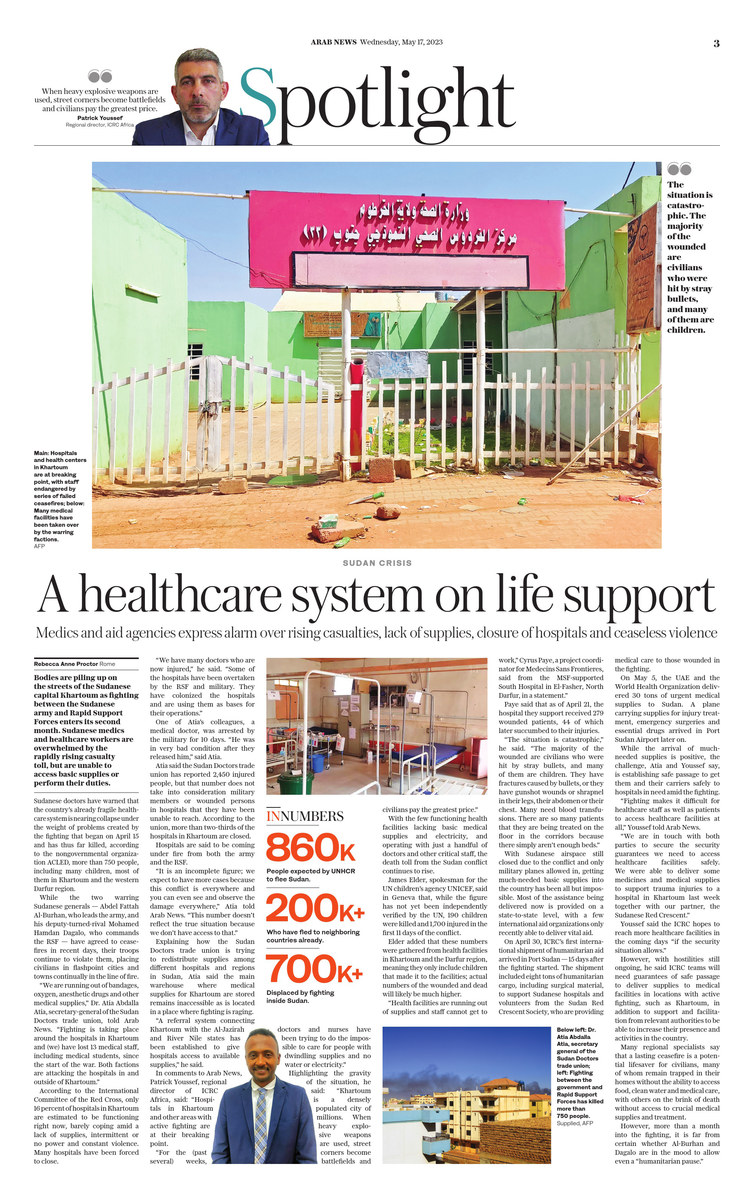ROME: Bodies are piling up on the streets of the Sudanese capital Khartoum as fighting between the Sudanese army and Rapid Support Forces enter its second month. Sudanese medics and healthcare workers are overwhelmed by the rapidly rising casualty toll, but are unable to access basic supplies or perform their duties.
Sudanese doctors have warned that the country’s already fragile healthcare system is nearing collapse under the weight of problems created by the fighting that began on April 15 and has thus far killed, according to the nongovernmental organization ACLED, more than 750 people, including many children, most of them in Khartoum and the western Darfur region.
While the two warring Sudanese generals — Abdel Fattah Al-Burhan, who leads the army, and his deputy-turned-rival Mohamed Hamdan Dagalo, who commands the RSF — have agreed to ceasefires in recent days, their troops continue to violate them, placing civilians in flashpoint cities and towns continually in the line of fire.
“We are running out of bandages, oxygen, anesthetic drugs, and other medical supplies,” Dr. Atia Abdalla Atia, secretary-general of the Sudan Doctors trade union, told Arab News. “Fighting is taking place around the hospitals in Khartoum and (we) have lost 13 medical staff, including medical students, since the start of the war. Both factions are attacking the hospitals in and outside of Khartoum.”
According to the International Committee of the Red Cross, only 16 percent of hospitals in Khartoum are estimated to be functioning right now, barely coping amid a lack of supplies, intermittent or no power, and constant violence. Many hospitals have been forced to close.
“We have many doctors who are now injured,” he said. “Some of the hospitals have been overtaken by the RSF and military. They have colonized the hospitals and are using them as bases for their operations.”
One of Atia’s colleagues, a medical doctor, was arrested by the military for 10 days. “He was in very bad condition after they released him,” said Atia.
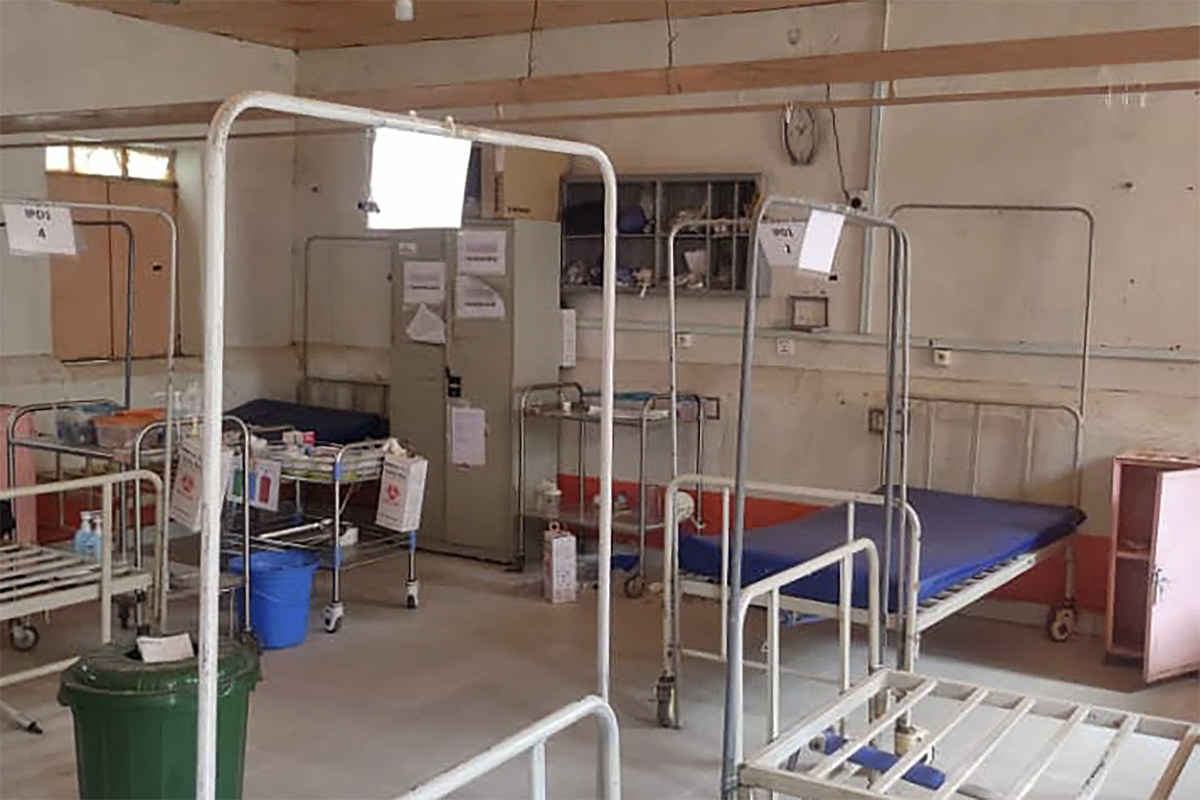
An abandoned hospital in El-Geneina, the capital of West Darfur, on May 1, 2023 as deadly fighting continues in Sudan between rival generals’ forces. (AFP)
Atia said the Sudan Doctors trade union has reported 2,450 injured people, but that number does not take into consideration military members or wounded persons in hospitals that they have been unable to reach. According to the union, more than two-thirds of the hospitals in Khartoum are closed.
Hospitals are said to be coming under fire from both the army and the RSF.
“It is an incomplete figure; we expect to have more cases because this conflict is everywhere and you can even see and observe the damage everywhere,” Atia told Arab News. “This number doesn’t reflect the true situation because we don’t have access to that.”
INNUMBERS
- 860,000+ People expected by UNHCR to flee Sudan.
- 200,000+ Who have fled to neighboring countries already.
- 700,000+ Displaced by fighting inside Sudan.
- 750+ Death toll estimated by ACLED as of May 3.
Explaining how the Sudan Doctors trade union is trying to redistribute supplies among different hospitals and regions in Sudan, Atia said the main warehouse where medical supplies for Khartoum are stored remains inaccessible as it is located in a place where fighting is raging.
“A referral system connecting Khartoum with the Al-Jazirah and River Nile states has been established to give hospitals access to available supplies,” he said.
In comments to Arab News, Patrick Youssef, regional director of ICRC Africa, said: “Hospitals in Khartoum and other areas with active fighting are at their breaking point.
“For the (past several) weeks, doctors and nurses have been trying to do the impossible to care for people with dwindling supplies and no water or electricity.”
Highlighting the gravity of the situation, he said: “Khartoum is a densely populated city of millions. When heavy explosive weapons are used, street corners become battlefields and civilians pay the greatest price.”
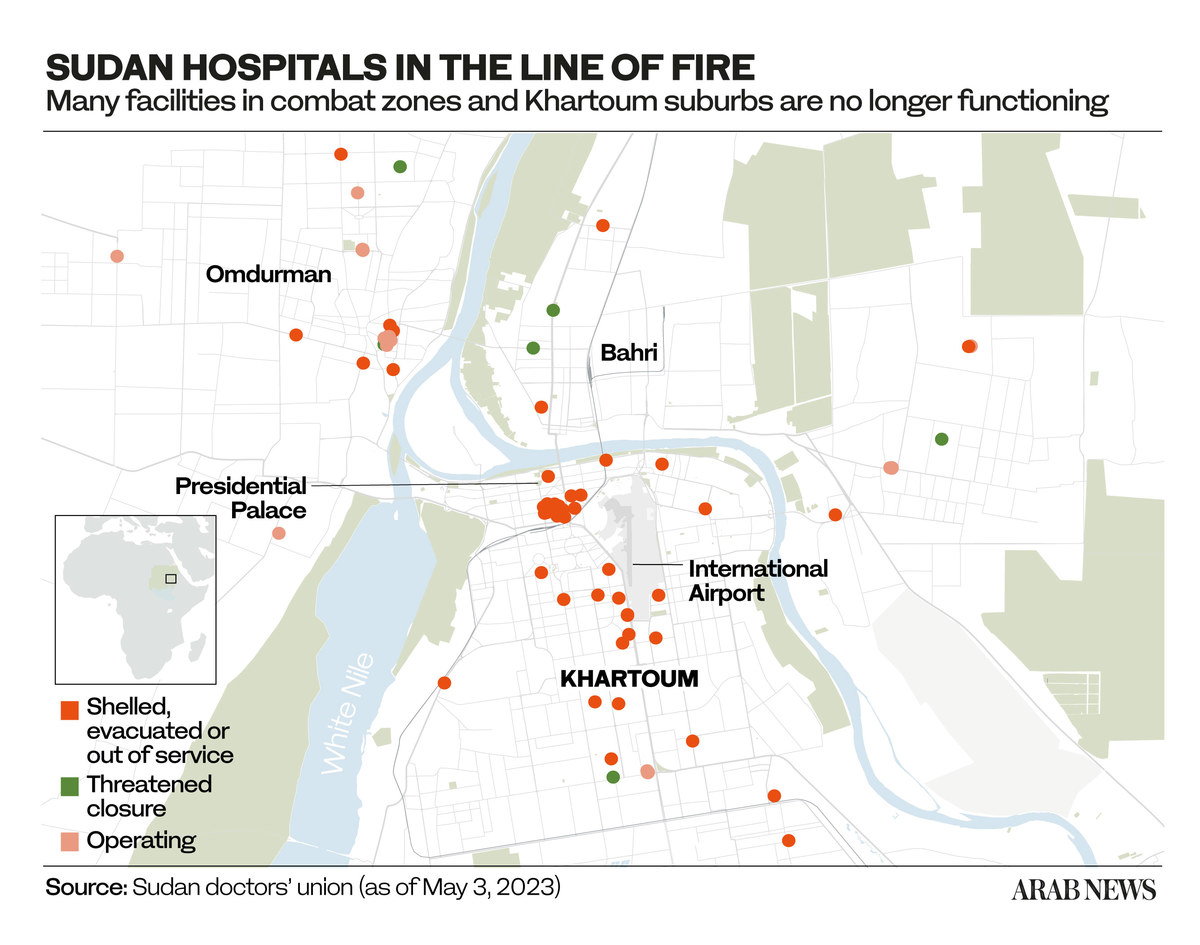
With the few functioning health facilities lacking basic medical supplies and electricity and operating with just a handful of doctors and other critical staff, the death toll from the Sudan conflict continues to rise.
James Elder, spokesman for the UN children’s agency UNICEF, said in Geneva that, while the figure has not yet been independently verified by the UN, 190 children were killed and 1,700 injured in the first 11 days of the conflict.
Elder underlined that these numbers were gathered from health facilities in Khartoum and the Darfur region, meaning they only include children that made it to the facilities; actual numbers of the wounded and dead will likely be much higher.
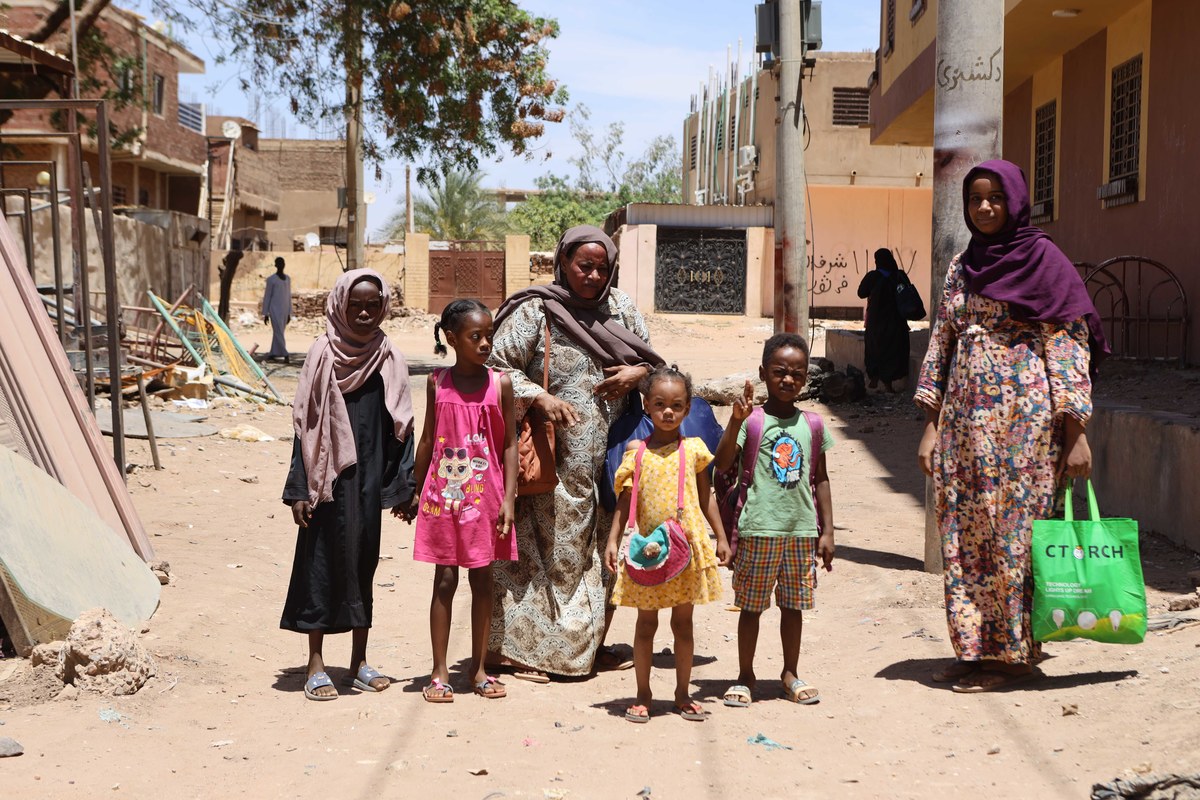
Sudanese are suffering as the fighting stretches on past the third week into the second month. (AN photo by Faiz Abubakr)
“Health facilities are running out of supplies and staff cannot get to work,” Cyrus Paye, a project coordinator for Medecins Sans Frontieres, said from the MSF-supported South Hospital in El-Fasher, North Darfur, in a statement. “Health workers, relief workers, and rescue workers have all become immobilized by the fighting and people are dying as a result. Access is what will change this.”
Paye said that as of April 21, the hospital they support received 279 wounded patients, 44 of which later succumbed to their injuries.
“The situation is catastrophic,” he said. “The majority of the wounded are civilians who were hit by stray bullets, and many of them are children. They have fractures caused by bullets, or they have gunshot wounds or shrapnel in their legs, their abdomen, or their chest. Many need blood transfusions. There are so many patients that they are being treated on the floor in the corridors because there simply aren’t enough beds to accommodate (them).”

While Al-Burhan and Dagalo have agreed to ceasefires in recent days, their troops continue to violate them, placing civilians in flashpoint cities and towns continually in the line of fire. (AN photo by Faiz Abubakr)
With Sudanese airspace still closed due to the conflict and only military planes allowed in, getting much-needed basic supplies into the country has been all but impossible. Most of the assistance being delivered now is provided on a state-to-state level, with a few international aid organizations only recently able to deliver vital aid.
On April 30, ICRC’s first international shipment of humanitarian aid arrived in Port Sudan — 15 days after the fighting started. The shipment included eight tons of humanitarian cargo, including surgical material, to support Sudanese hospitals and volunteers from the Sudan Red Crescent Society, who are providing medical care to those wounded in the fighting.
On May 5, the UAE and the World Health Organization delivered 30 tons of urgent medical supplies to Sudan. A plane carrying supplies for injury treatment, emergency surgeries, and essential drugs arrived in Port Sudan Airport later on. The shipment, valued at $444,000, is the first that the WHO has been able to deliver by air to Sudan since the outbreak of the conflict.
WHO distributed supplies to Sudanese health facilities prior to the escalation of conflict, but these were exhausted after just a few days given the number of injured.
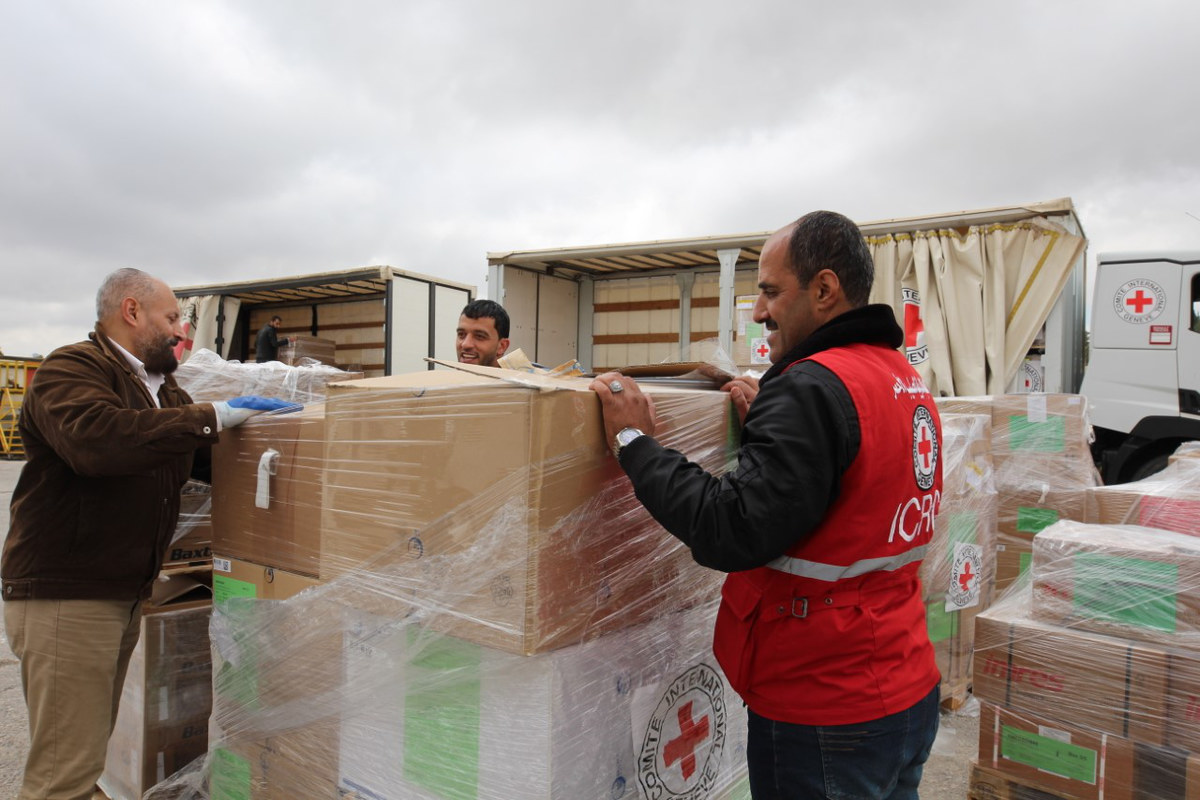
ICRC’s shipment of humanitarian aid arriving in Sudan. (Supplied)
While the arrival of much-needed supplies is positive, the challenge, Atia and Youssef say, is establishing safe passage to get them and their carriers safely to hospitals in need amid ongoing fighting.
“Fighting makes it difficult for healthcare staff as well as patients to access healthcare facilities at all,” Youssef told Arab News.
“We are in touch with both parties to secure the security guarantees we need to access healthcare facilities safely. We were able to deliver some medicines and medical supplies to support trauma injuries to a hospital in Khartoum last week together with our partner, the Sudanese Red Crescent.”
Youssef said the ICRC hopes to reach more healthcare facilities in the coming days “if the security situation allows.”

Many civilians remain trapped in their homes without the ability to access food, clean water, and medical care. (AN photo by Faiz Abubakr)
However, with hostilities still ongoing, he said ICRC teams will need guarantees of safe passages from the parties to the conflict to deliver supplies to medical facilities in locations with active fighting, such as Khartoum, in addition to support and facilitation from relevant authorities to be able to increase their presence and activities in the country.
Many regional specialists say that a lasting ceasefire is a potential lifesaver for civilians, many of whom remain trapped in their homes without the ability to access food, clean water, and medical care, with others on the brink of death without access to crucial medical supplies and treatment.
However, more than a month into the fighting, it is far from certain whether Al-Burhan and Dagalo are in the mood to allow even a “humanitarian pause.”
